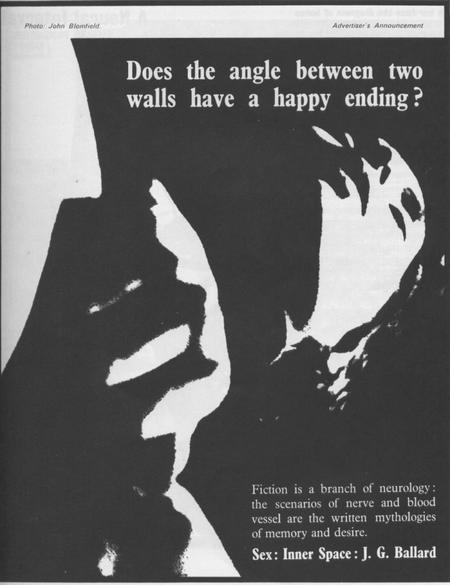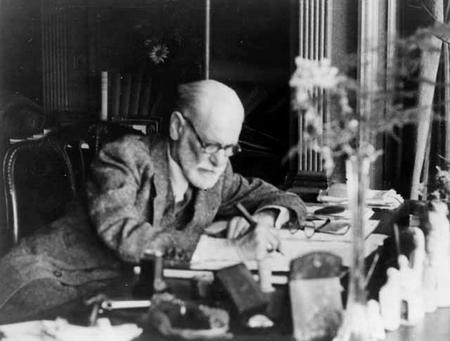December 31, 2004
Could he be more Cold Rationalist?
'All those architects and lawyers - the most radical thing they can imagine is burning down St Paul's School for Girls. They don't realize their lives are empty.'
'Is that true? Most of them love their children.'
'DNA. Biology's first commandment. Take no more credit for loving your children than birds take credit for nest-building.'
'Civic pride?'
'The gene pool's neighbourhood watch scheme.'
- Ballard, Millennium People
December 30, 2004
INDIFFERENTISM AND FREEDOM

Deckard to Tyrell: 'How can it not know what it is?'
Gothic Materialism, Second Principle: There are no subjects, there is only subject-Matter. “Selves are no more immaterial than electronic packets.” “Private persons are [...] simulacra.”
By now you really shouldn't expect anything more, but the robust intransigence of Human Security in the face of challenges from Cold Rationalism is astonishing.
Take Freud and psychoanalysis. Everyone thinks they know what Freud says, it's all about sex*, been there, done that, cognitive psychology has refuted it via empirical research, normal service has been resumed.
Freud himself provided the machinery for understanding this immuno-response.
What Freud's discoveries - like those of Darwin before him - provoke in the speaking animal is trauma, and the automatic response to trauma is shutdown, anaestheticization. This thing that is happening to me cannot be happening to me. Hence the otherwise inexplicable outbursts of Hot Blooded Males (HBMs) when confronted with Cold Rationalism. You tend to think, 'My god, can't they read?' but then realise that what you are up against is - as, it seems, they will freely admit - not anything rational, but a programmed autonomic response from deep in the Mammalian defence strata.
They might as well just bare their teeth.

What Human Security defends is a species narcissism, a conviction that homo sapiens are special. Psychoanalyis acknowledges that the speaking animal has been cursed by a feeling of its own specialness. But it does more than challenge this notion of specialness, it shows that, yes, there is something unique about human beings, but this uniqueness is above all the source of specifically human miseries.
Speech - in particular in its form of the 'internal dialogue' - is the form of our curse. The speaking animal can think, It thinks; unlike other animals, it tells itself, it can reflect upon itself and its condition. And yet, as Schopenhauer realised, we are the unhappy animal precisely because we are incapable of animal narcissism, of living in the present, of just being what we are. For the speaking animal, things - including the animal itself - do not coincide with themselves. This is the Schopenhauerian/ Freudian/ Lacanian version of the Fall (The Fall, incidentally, is the only aspect of Christianity about which Schopenhauer is not contemptuous).
Trapped in the world of Words - or, to be more accurate, the world in which Words and Things do not quite coincide - the speaking animal can either seek to commensurate itself with the arbitrary, Alice-in-Wonderland signifying labyrinth in which it is inserted and identify with the Symbolic order, or else, grotesquely and impossibly, seek to escape back to what preceded signification - the myth of the 'Continunous', the pre-separate, the Whole. In Lacanian terms, this means a fixation on the Imaginary.
Crucially, both these options are tragic. Those who identify with the Symbolic order are the neurotics marked by the No/Name of the Father, defenders of a 'reality principle' which, far from being generated from any contact with the Real, is a kind of articulation of the Symbolic order itself, the vampiric voice of the big Other, which does not exist, but whose mortifying effects are evident in every human CNS. By contrast, those who identify with the Imaginary refuse the reality principle, but inevitably confirm it, since their bid to be re-united with the maternal body (and hence to cease to be) cannot succeed.

Clearly, this system offers nothing but a the opportunity to select your agony: the famous Hobson's choice between ordinary misery and anguished insanity that Freud, idenifying with the Name/ No of the Father, famously offered. But, far from being a rejection of Freud, the schizoanalytic critique of psychonalysis - like the one presented simultaneously by Irigaray - proceeds on strictly Freudian principles. Freud has provided us with the Radical Enlightenment description of the Human OS = Anthropol, the speaking animal prison police. The question to be posed, then, is why ally yourself with Anthropol? Why insert yourself in the Symbolic order in this way? Why transcendentalize the arbitrary confections dreamt up by a particular animal's socio-biotic coding? And these questions are no more than a repetition of the endlessly reiterating starting point of psychoanalysis, which was always, even before Freud wrote the essay of that name, located beyond the pleasure principle.
What Freud had discovered in the consulting rooms of Vienna was essentially a rediscovery of what Spinoza had demonstrated three centuries before in Amsterdam. Far from being a rational agent, the speaking animal is a vicious mammal with a seemingly infinite capacity to devise ways to cause itself damage.
There is a deliciously, savagely ironic quality to this pain-machine, as
it operates by seeking to reduce tension in the human organism. Since the organism simultaneously experiences the reality principle as an intolerable pressure and also knows, at the level of the unconscious, that its identity nevertheless depends upon submitting to the symbolic order, it will seek to escape the tension that it is by various means of self-destruction. The famous pessimism of Freud's works of the Twenties and Thirties arose from confronting this hideous machine both on his couch in the form of individual psychopathologies and in the surrounding European culture, which had thrown itself into a hellish war whose only rationale, Freud conjectured, could be found in a libidinal impulse towards auto-annihilation. Micro and macro Thanatos, the death drive manifested in individual neurosis and species level suicide.
Now, in analysing the tendency of human beings to destroy themselves, Freud is much more ready to count himself as the successor of Nietzsche than of Spinoza. Freud was enthused by Nietzsche's psychology of anthropoid self-laceration, and these analyses, as presented in their most developed form in The Genealogy of Morals, also prove indispensable to Deleuze and Guattari's Anti-Oedipus.
These are the most important passages in Nietzsche's writings, and certain other of Nietzsche's most significant ideas - especially his idea of motivational analysis, that we should look to the philosopher for the key to the philosophy - feed into the psychonalytic truism that there is no 'objectivity'; in other words, there is no libidinal neutrality, everything that we want has designs upon us.
But Nietzsche also lends himself to appropriation by the ideologues of the cultural logic of late capitalism.
The first chapter of Beyond Good and Evil effectively argues that ad hominem attacks are not only justified, they are the only type of legitimate philosophy. But Nietzsche's assaults on philosophers are not even well-substantiated; they are a kind of a priori ad hominem attacks along the lines of, 'You MUST be saying this because.....' Nietzsche presents, for instance, Spinoza as a loner and failure, something that was much more of Nietzsche himself than of Spinoza if we are to believe the biographical accounts.
Nietzsche's great enemy, the foe to which he keeps returning, is Indifferentistm, as expressed through the philosophies of Spinoza, Kant , Schopenauer and the Stoics. What is his problem with these thinkers for Nietzsche? It is not that he substantively disagrees with them about their philosophical descriptions of the world. It could hardly be that: Nietzsche's critique of the Cartesian cogito had already been executed by Kant, while his dismissal of anthropomorphic and absolutist conceptions of Good and Evil (along with many other of his major conceptual commitments) had been rehearsed by Spinoza.
You begin to suspect, rather, that it is the proximity of Nietzsche's thought to the Indiferentists which provokes his agitation. His objections are at a meta-level, and are in essence twofold.
First, the Indifferentists pretend to speak from a truth that exceeds their own embodied perspective. In Nietzsche's outrage here, you can hear a pre-echo of all the doxas that will be passed off as radical in the liberal academy in the late twentieth century. Nietzsche may well have been the first philosopher to make the disastrous move that has now become a commonplace amongst proponents of the 'politics' of difference: from the obvious truth that many philosophies affecting to speak from universality have in fact expressed, albeit unconsciously in many cases, a partial, white male perspective, they conclude that universality is ITSELF white and male. The way is then open to multiplication and marketing of 'differences', and the 'politics' of solipsism, one of Kapitalism's greatest ideologoical weapons.
Secondly, Nietzsche complains, the indifferentists are too detached, not EXCITED enough. They believe, erroneously according to Nietzsche, that they can SUBDUE their passions. Such a subduing is not possible, of course (the will to subdue the will is just another will) and, besides, it is undesirable. Indifference is a denial of perspectivity, the very condition of life.
Perspectivity may well be the condition of life, but why be on the side of life? Freud's painstaking analyses and speculations in Beyond the Pleasure Principle have established that all vital energies are ultimately in the service of death; Thanatos runs the organic show from the very start and up to the very End: life is a deviation on the way to death. Deleuze and Guattari try and save vitalism with the notion of 'non-organic life' , but they are avoiding, or at least deflecting, the insight that Spinoza (whose impersonal mechanics had no place for the life-death distinction). Schopehnauer, Freud and Lacan based their work upon: the perception of an anorganic flatline which manufactures the so-called vital as part of its indifferent process of endless production without final cause. Kant called this pursposiveness without purpose, Schopenhauer blind will, Freud, Thanatos.
Nietzsche saw himself breaking away from Schopenhauer's pessimism by rejecting what he saw as his monism. There is only life, life is only will, we must affirm the will. In other words, we must affirm what we are (=) becoming. Hence Nietzsche's allegedly impersonal philosophy - which decries subjectivity as a kind of contamination of thought by grammar - ends up as an Egotism alll but indistinguishable from a cult of personality.
The danger, the great temptation, is to retain the dualism between the impersonal and the personal that Freud had so expertly dismantled. Ray put this to me very well once: we cannot think in terms of an opposition between the personal and the impersonal, as if granny doing her knitting was the personal, and the impersonal was the remorseless, gleaming wheels of the Kaptitalist megamachine. No. Granny too is impersonal, and the Kapitalist megamachine produces personality alongside cars and computers.
The great Cold Rationalist lesson is that everything in the so-called personal is in fact the product of impersonal processes of cause and effect which, in principle if not in fact, could be delineated very precisely. And this act of delineation, this stepping outside the character armour that we have confused with ourselves, is what freedom is.

Zizek puts this brilliantly in Tarrying with the Negative, in his analysis of Blade Runner:
'Blade Runner ... gives a double twist to the commonsense distinction between human and android. Man is a replicant who does not know it; yet, if this were all, the film would involve a simplistic reductionist notion that our self-experience qua free "human" agents is an illusion founded upon our ignorance of the causal nexus which regulate our lives. For this reason, we should supplement the former statement: it is only when, at the level of the enunciated content, I assume my replicant status, that, at the level of enunciation, I become a truly human subject. "I am a replicant" is the statement of the subject in its purest - the same as in Althusser's theory of ideology where the statement "I am in ideology" is the only way for me to truly avoid the vicious circle of ideology (in the Spinozean version of it: the awareness that nothing can ever escape the grasp of necessity is the only way for us to be truly free). In short, the implicit thesis of Blade Runner is that the replicants are pure subjects precisely insofar as they testify that every positive, substantial content, inclusive of the most intimate fantasies, is not their own, but already implanted.** In this precise sense, the subject is by definition nostalgic, a subject of loss.' (40-41)
It is for this reason that Deleuze-Guttari say that the subject arrives 'at the end' - the product of a machinic process which misrecognizes itself as the process's final cause. Kapitalism requires you to identify with yourself as 'the subject of loss', the crippled neurotic who lacks the power to act, sentimentally attached to an interiority which was never there.
Theism has retreated, not vanished. The conviction that there is a Factor X, some inexplicable, ineffable residue over and above genetics, neurology and social coding that makes you you - this is the 'soul supersition' that Nietzsche rightly exoriated. It is the belief that the human is ultimately explicable in biographical and personal terms which Cold Rationalism emphatically rejects, maintaining, rather, that the personal and the biographical are only explicable in machinic and impersonal terms.
All of which is why ignoring or extirpating references to the so-called personal on k-punk would be very obviously failing to achieve Spinozist rational consistency. Spinoza responds in advance to Nietzsche's injunction that philosophy must be subordinated to action - it is how we live that matters, not the consistency of our thought (unlike Nietzsche, however, Spinoza recognizes that we cannot just produce Bubble Economic Matrix Bedtime stories at will just to make life better for ourselves). But the scandal of Spinoza's thought is that it allies LOGICAL consistency with ETHICAL consistency. Human behaviour is explicable using the same geometric grids that have been produced by mathematicians.
It is here that HBMs usually recoil in horror. But part of their antipathy is based upon the Neuromantic misunderstanding of reason and the rational, which it equates with a kind of rigorised commonsense (but, as Kant showed, commonsense is precisely that which cannot be 'rigorised'). It is this sense of the rational that is invoked when, faced with anomalous phenomena, characters in films proclaim that 'There must be a rational explanation for this'.
The anomalous is not irrational.
Reason is not commonsense.
Rationality does not disclose a world that fits with the Human OS scanning pattern at all.
Which is why Cold Rationalists are psychotics.
But that's (the beginning of) another story.
* Freud says the opposite of course. For humans, there is no sex, in the 'biological' sense. Sex for speaking animals is nothing but signs. There is no desire for sex with the mother, since the so-called desire for sex with the mother is, in reality, a desire to have done with what both 'sex' and 'the mother' represent, i.e. organic individuation.
** As if to prove the point that all thought is manufactured, compare this with the sections in my thesis about Blade Runner. Zizek has been the major influence in allowing me to see that psychoanalysis, far from being troubled by what I was saying there, actually argued precisely that. Which is why it is still troubling to Human Security.
December 29, 2004
WOMAN OR WEED?
Obv, I hadn't read Simon's list when I produced mine in splendid isolation in Wales. (Good job I forgot to include my 'Most Pointless' category - unopposed winner: Goldie Lookin Chain. Comedy rap in 2004. Why? - or we'd have been almost TOTALLY at loggerheads.)
But I have to say, and it'll be no surprise to any of ya - this question in respect of Skinner - 'is he staying in cos he’s in love with the girl or the weed?' - neatly sums up why I loathe The Streets. Imagine the state of abjection you would have to be in to EVEN CONSIDER prefering weed to a woman. I suppose that's what it is to be a lad, though. :-)
END OF YEAR ROUND UP
Best of times, worst of times, all that.
Perhaps mercifully, I can’t remember much from the start of 04 – intermittent continuity gaps being one of the consequences of periodic mental debilitation – but I like to think that my recovery is more than a personal matter (and only partly because there is nothing personal).
When I started k-punk, things couldn’t have seemed more hopeless. The APE was running the show, no amount of encouragement from the likes of Luke and Matt could convince me that what I was typing wasn’t abject… And yet, the writing continued… I must go on, I can’t go on, I’ll go on… Proof that writing, far from being about self-expression, emerges in spite of the subject.
The role of the Net-based collective machine in getting me out of Hell cannot be underestimated.
It can’t only have had that effect on me.
What’s happening on the web is part of a wider cultural switch-over.
Effective analysis of Kapitalism was well nigh impossible during the Bubble 90s – ‘apparently victorious’ Kapital programmed both the irrational exuberance of its slaves and the depression of its enemies. But now, Kapital’s techniques are visible, and that’s half the battle. When you realize you’re dealing with a political pacification program that aims to emiserate you, when you see that there are no relative autonomies, that Anti-Capital is not only possible, it’s already happening – you know you’re in a war in which the highest imaginable stakes are up for grabs. The war is always here and now --- fought in, over and through the nervous systems of human beings.
For me at least, 2004 was the year in which PoMo finally died. And if that’s not a reason to celebrate, I don’t know what is.
No Inferno in PoMo, only a Purtagory in which we were condemned to shamble
, vaguely irritated, vaguely emolliated, through the striplit soft delirium of the End of History Supermarket. No way out of its seamless aisles, all will to escape debilitated in any case. A fake Forever, in which the future meant more of the same and the past was processed only as a precursor to this. It was always going to end up here, didn’t you know?.
When faced with questions of injustice or of the systemic inequity of Kaptial, the two things that students routinely say are, ‘There’s nothing you can do about it’ and ‘that’s just one interpretation, it’s all a matter of opinion’. Ventriloquists of Kapital, the stock phrases evidence that Postmodernism is a deeply entrenched (anti-) political program...
It’s telling, if predictable, that the two aspects of Nietzsche’s thought which meet least resistance are those which feed into postmodern quietism. Nietzsche’s aestheticism, or, rather his aestheticization, his claim that life, not truth, is the only criterion for making judgements, and, crucially, that life is a work of art, dovetails easily into his epistemology, his well-known dismissal of universality in the name of embodied perspectivity.
By contrast, Nietzsche’s genuinely radical critique of the subject, personality and resentment - i.e. those parts of his thought which point away from postmodern Romanticism and towards an austere structuralism - are accepted only in a gestural and academic way. Yes, it can be acknowledged that, philosophically, the notion of the subject cannot be sustained, but only so long as we think that really, in everyday life, that doesn’t matter and that, really, at the end of the day, the truth of what we are is subjectivity and biography.

Naturally, it is in this ‘really’, in this supposed turn away from theory, that we encounter the most important theory of all – the unspoken meta-political script that sustains the current scanning pattern we are invited to think of as reality. The hostility and the derision that the Cold Rationalist dismissal of (uninteresting) fictions such as biography and personality still meets is ample evidence that, though most ‘educated’ types will have felt the need to go through a window-dressing deference to structuralism and cybernetics at some point in their lives, structural and systemic thought remain radically unassimilable. All too often, such ideas are used as aesthetic ornamentation to dress up old ontologies, ways of ‘reading’ that bloat the academy’s voracious and vacuous interpretosis.
Against interpretation, against writing conceived of as an act of self-expression, against aestheticism…yes… but none of this entails an anti-music, anti-Pop stance. Far from it.
The question of what the relationship between sonic culture and politics can be is far from resolved, obviously. Was punk what Britain had instead of ’68? Does the centrality of sonics to punk mean set it up for aestheticist reterritorialization? Yes, sonics are immediately affective in a way that visual art and literature are not. But that doesn’t mean that they must be irrational intoxicants any more than they must be celebrity-consumer background muzak.
So....
SONICS
Singles: Top 9

Avril Lavigne – ‘Don’t Tell Me’. Avril takes a tough stand against Male Sex Virus. ‘Get outta my head/ get offa my bed…’ C’mon admit it, if it was by anyone else you’d love it. ‘Don’t tell me what to do/ don’t tell me what to say/ you’re better off that way.’ Had those lines in my head at work many times this year, I can tell you.
Britney - ‘Toxic’. Britney resumes her throne as Queen of Pop, and raises the stakes, establishing that, for Pop not to be swaggeringly, swooningly 3-D hectic and John Barry lush in 04 is just plain slack. Given extra unlife by the turbo-charged Armand van Helden rmx --- sounds like Visage's 'Tar' (check it).
Usher - ‘Yeah’. 04’s ‘Billie Jean’. The morning after the night before, intoxication devolving into anxiety, cut-up memories resolving into an enigma: ‘what happened?’ Usher the Zeroes’ Jacko: a funk puppet slave to the r and b, subordinating Ego to groove in a way that our tawdry theatre-school prancers (Robbie, Geri) couldn’t even dream of. Not even Ludacris’ lewd carnality can foul up the high come down hyper-abstraktion of L’il Jon’s post-rave production. (Incredibly, on ‘My Boo’, Usher also managed to rescue Alicia Keys from the oblivion of coffee table tastefulness.)
Destiny’s Child – ‘Lose My Breath’. An imperious return, hyper-energetic in a way that Beyonce’s solo ballads were lugubrious treacle-slow lethargic. DC back with the experimental avant-Pop that was their trademark, raising expectations that the album couldn’t have disappointed more spectacularly. After ‘Soldier’, there is … nothing….
Kanye West – ‘Slow Jamz’. Could have chosen any of the singles, but plumped for ‘Slow Jamz’ because it was the breakthrough cut, reacquainting rap with a melted, courtly- deferential male desire that, via Blackstreet’s ‘No Diggity’, it made fleeting contact with a decade ago.
Girls Aloud – ‘The Show’. Sleek, modern, efficient, confident, and preposterously addictive. Pop as it should be: mass-produced, impersonal-machinic and fronted by super-synthetic gyndroids.
Rachel Stevens – ‘Some Girls’. Richard X continues to put the modernism back into postmodernism, shamelessly (re)vamping Goldfrapp, Frankenstein-reanimating Glam stomp and rewinding Pop to when it had a future.
Morrissey – ‘Irish Blood, English Heart’. No-one can have been more surprised than Morrissey to find himself suddenly relevant in the UK in 2004. Selected if only as a reminder of the once-vibrant k-punk comments boxes. In retrospect, the Morrissey discussion was the beginning of the end for high quality discussion here, as male antler-rubbers couldn’t resist the temptation to boy-bait, leaving blood in the water that would inevitably draw other Troll-sharks in.
Christinia Milian – ‘Dip it Low’. Shows that beat-hiccoughing, spastic-coloned slick R and B is not dead.
Special mentions to: Jamelia, ‘Thank You’ (Nietzschean single of the year, in every good way, but someone have a word with her stylist, she’s definitely the worst dressed in Pop); Natasha Bedingfield (all three singles), Kelis ‘Trick Me’, Anastacia (in a world of smaller than life blokish 'cool’ she dares to be ridiculous).
Albums: Top 6
Epochal
Kanye West - College Drop Out, Junior Boys Last Exit
Two LPs that, otherworldly and pneuma-Light, couldn’t have less to do with the bloke ‘n’ bling hylic heaviness of the current Brit popcult climate. By etherealizing hip-hop’s rhythmic engine, they disabuse us of the oppressive delusion that there is any necessary connection between rhythmic invention and the dour, sour surliness of masculine acquisitive aggression with which hip-hop has habitually coupled it for so long now. ‘They made us hate ourselves and love their wealth…’ The drug of choice for both producers is abstract oestrogen, the antidote to the testosterone-heavy pop-cultural diet of bang for your buck spec(tac)ular overstimulation. Both are ‘High Come Down’ records, post-rave, late-night, tactile, hypersensual…
The rest
Dizzee Rascal – Showtime
Dizzee avoids the Goldie trap, by not allowing flatterers to deceive him. So, no, there won’t be guest slots from Justin Hawkins on gee-tar or that drip from Coldplay on vox, thanks very much. Showtime is the sound of a terrible isolation, but a willed isolation that is the consequence of steely resolution and calm confidence. The Roll Deep clamour of the first LP is gone, and with it, the exhilarating abstraction of its PlayStation-constructed cartoon constructivism. What’s left is a brooding bass ooze, a kind of viscous halfspeed Jungle, and Dizzee, alone, an interloper-observer in the restricted areas to which his success has given him access. Showtime is the post-Garage Exile on Mainstreet, and also, in its outsider’s insight into the English deer park world of cocaine prosperity, 04’s answer to 82’s Hex Enduction Hour.
Britney - My Prerogative: Greatest Hits
Easy to forget how many perfectly produced cyberpop-confections Britney has been the flesh-voice component in. My Prerogative is a delicious reminder, an ecstasy rush through all the hits. Hits indeed. Because Britney’s Femasochistic Pop may all turn out to be about different meanings of the word ‘hit’. If it all started with a schoolgirl-submissive invitation to do her emotional violence, Britney’s seemingly fatally stalled career was revived last year with a less than subtle entreaty, “I need a hit… baby, give me it…’ And if, as Angus says, a world without ‘Toxic’ in it is scarcely imaginable any more, it’s easy to forget how plaintive and pathetic that line was in danger of sounding when the single was released.
Last year, it was Britney who looked past it, the appalled Justin looking on as his Ex was apparently reduced to kissing Madonna on MTV in what for all the world looked like a desparate bid for attention, any attention. Britney’s inspiration, Madonna, had so eclipsed her that the invitation to appear in the MTV Awards show number looked like a humiliating act of pity; her chief rival, Christina, was striding forward in an Amazonian march of auto-exploitative, big-lunged success; and critics were falling over themselves to heap praise upon Justin’s Neptunes and Timbaland-produced LP.
‘Toxic’ reversed all this, and the greatest hits comp reveals a wealth of Pop treasures that expose Xtina’s back catalogue for the litany of yowling banality that it is. N*E*R*D are a laughing stock, and, with a year’s perspective, it’s easy to see that the singles they produced for Justin, while presentable enough, aren’t a patch on ‘Slave 4 U’, Chad and Farrell’s best production, bar none. SFJ was wrong: far from being a victim of rockism, Justin (still male, still tasteful, with impeccable influences - Off the Wall-era Jacko, Soul – to which rockists readily defer) actually benefited from a crypto- or rearguard rockism But Britney – vulgar and tasteless, machine-manufactured in the Trailer park-MTV-military-industrial-entertainment complex and with ABSOLUTELY NO SOUL any of us consumers care about – is still the litmus test of anti-rockism. Go on, admit you love her.
MarkOne and Virus Syndicate - One Way/ VA - Grime
It needed someone outside the capital to synthesize the East and South London Grime sounds. The Billingsgate verbal frenzy of the East and the depopulated post-nuclear Croydon ring road of the South have been met in Manchester, on a ‘Dance’ music LP that, gratifyingly, is compulsive over its full length, The album actually outstrips the potential displayed on the MarkOne tracks from Rephlex’s brilliant Grime comp. It leers and lurches with a controlled synthetic menace, as much a continuation of the curtailed anti-tradition of North English electronica as it is a phase in the devolution of Garage.
Best live

Moloko. Roisin effortlessly dominates the stage, the musician-men rightly reduced to bit-part servomechanical supports for her Ladytronic performance art. She is a Pop Star in a way that has become old-fashioned; all her glamour is conceptual and arty, which in no way subtracts from its sensuality (and so couldn’t form more of a contrast with Brit so-called conceptual so-called art). She knows how to use words, she knows how to use her voice, she knows how to use her face, she knows how to use her body. Because Pop without Glam is just music….
Most ludicrously overrated (is anyone still listening)? really?): The Streets
Surely even Skinner’s most loyal supporters must be given pause by the readiness with which he is championed by the post-Loaded beery, leery LLAD lobby. That co-option is no surprise, since the Streets specialize in that warmhearted fuzzy sentimentality beloved of wifebeaters , thug-drunks and other hot irrationalists everywhere, coz underneath y’know they are really sensitive (ask Gazza). Skinner is like the worst kind of pub bore, the amateur psychologist who imagines that his pitifully limited observations of ‘birds’ qualifies him to sidle up to you and proffer his facile homilies. Been dumped? ‘Plenty more fish in the sea, mate, get em in.’
But at least most other bar bores don’t back up their words of wisdom with cack-handed, Quo-tidian, quasi-Casio, sub-ska, pub-‘Garage’ that allows indie-windies to whine, “I do like SOME dance music…’ I know it might have been a novelty a few years ago to hear about chip shops on a ‘Dance’ track but, after Dizzee and Grime, there is no possible case to be made for Skinner’s pious and pompous know all-isms . It’s bad enough having to walk past boozombies lurching out of a KFC, I don’t want to listen to one in my own home, thanks.
FILMS
I, Robot
See forthcoming piece on Hyperstition, but, without doubt, the best cyberpunk film ever. And yes, that includes Blade Runner.
Spiderman 2
Don’t know what happened to the review I sent to Mute, but this comfortably outstripped the already brilliant original. Molina’s Doc Ock, the best cybernetic criminal genius ever to hit celluloid.
ART
Bruce Nauman @ Tate Modern.
Paula Rego @ Tate Britain. Even a handful of paintings enough to reduce the surrounding Shit Art context to embarrassing Maya. Contrast of the year: walking past that pitiful reconstructed house (‘negotiating with idea of domesticitiy….exploring notions of memory…’, go on, you can make it up yourself) to get to Rego’s sublimely impassive disturbing-exhilarating canvasses. For all that PoMo Sophists and Saatchi collaborators like to pretend the opposite (they would, it keeps them in work), the distinction between genuine art and utter tosh is actually not that hard to draw. Rego establishes that painting couldn’t be less dead. Brit Art couldn’t be more undead, a grey vampire sucking energy from all unfortunate enough to come into contact with it.
K-PUNK
Most stupid comment
Many candidates here, but. first prize goes to the Art Snob Saatchi Lapdog whose name I can’t be bothered to look up. In response to my description of Emin’s burnt tat, she (out)raged: ‘A tent with embroidery on it? You should be ashamed of yourself.’ Defending Emin now is like defending Pink Floyd in late 1975. Surely even the Saatchi apologists must be beginning to sense it’s embarrassing and that they are on the wrong side.
Most Valued k-punk correspondent
Karl Kraft – makes it all worthwhile
Most Missed
Carter McBeath – where is he?
Most indefatigable MSN contacts
Philip Mind – also hands-down winner of ‘best unpublished novelist’ prize
Glueboot – also hands-down winner of ‘most charming carnalist’ prize
Bacteria grrll – who needs to come back to the UK
JD – keeps me supplied with a steady diet of r and b and electropop
Favourite Female Speaking Animals
The Angel
Rural Pixy
They’re never warm enough, but their being around is the best guarantee that I stay out of Hell
Inspiration
Ray, Nina, Alberto – providers of indispensable Anti-Kapital, Anti-Personal, Anti-Karnal kit
Simon R, John Effay – in addition to everything else, proof that there's no need for dissent not to be elegant and intelligent
Luke – for being a Spinozist in spite of himself, and for contributing to my unplugging from Videodrome
Woebot – for obvious reasons
&Catherine – because worthwhile comment from one intelligent woman negates any amount of stupidity from hot-blooded males
Erase the World – so consistent
Nick Gutterbreakz – fellow explorer of the electrocontinuum
Students: Joe B, Sam A, Asuman B, Zoe D, Anna M, Michael O, Katerina, Aliya (if my students are anything to go by, women are SO much better than men at Philosophy – believe it…)
Hopes for 2005
Total collapse of liberal Kapitalist Parliamentarism. Only the rich notice the difference when their services and servants don’t arrive on time; the rest of us form a globalized network of autonomous collectivities.
Robbie Williams to expire in cocaine auto-erotic asphyxiation incident. ‘At least he died having sex with the only one he ever loved… himself…’ Back catalogue cancelled and all videos taken off rotation as a mark of respect.
Working class males to recover their birthright, wake up from the twenty year sportswear nightmare and start wearing handstitched Italian suits again. Blinking into consciousness, bemused and disgusted ‘What were we thinking?’ ‘Sportswear Sucks’ campaign culminates in rallies in which baseball caps, trainers and tracksuits are burned.
Bono to confess that, yes, he is a flabby egotist and irrelevant old man whose continued success is indicative not of any talent or importance, but a period of total popcultural conservatism.
(OK, the last one is pretty unlikely… but we can but dream.)
DEGANWY DIARY 2
Christmas Day

‘Your children are not your children, for they dwell in the house of tomorrow, which you cannot visit even in your dreams.’
- Epigraph on the DVD of the first series of The Tomorrow People, my brother’s Christmas present to me.
Intermittent flurries of snow, snow on the peaks of the mountains we can see from our front room… but not a white Christmas, quite.
By the estuary, a flock of what we later determine might be sandpipers in flight. The astonishing cybernetics of flocking. The flock as flight machine in which individual birds are micro-sensitive components, so hyperfast in its vertiginous veering changes of direction that the human perceptual-conscious system hasn’t a hope of keeping track.
Kylie megamix on TOTP… reminding us of how much enjoyment she could provide when she was just a flesh component in the SAW hit machine… before her main job was Being Kylie, as it is now…. … It was like the Faustian deal with the tabloids to necromantically revive her career stipulated that, if she really wanted to come back, all she could do was play the simpering simpersona, the death mask surgical-smiling stepford sex worker, FOREVER….
Lean’s Great Expectations: a study in concision and compression. You sigh with relief and recognition, remembering there is nothing remotely theatrical about Lean’s expressionistic version of Dickens’ Grimmest fairy tale. Character actors seemingly selected more for how their features will cast shadows than for their capacity to declaim. (If that was the case, naturally, I approve.)
Exactly when was it that the British lost the ability to think filmically?

Great Expectations, a misogynistic-Masochistic delirium, in which Dickens imagines the Lady Thing – the sweetest queen, the unattainable woman-object - cooked up in a lab of female resentment and revenge. A Horror that is closer to Blade Runner than Vertigo: there is no ‘real’ Estella in the way that there is a ‘real’ Judy distinct from the fantasmatic Madeleine. The Estella-ID is a construct all the way down. Peel it away, and there is … Nothing (which vacancy is the perfect support for Pip’s fantasies, of course).
For that reason, it’s necessarily the case that any actual actress must needs fall short of achieving the sublime dignity of Das Ding. Perhaps the screen Estella should have been a blank space…. In the way that Pip is shot, late on in the film, coming into a doorway, just a top-hatted silhouette, a Void, the filling out of someone else's (Magwich's) fantasy.

In Satis House, Estella and Pip are meat-marionettes in the deathly eternity of Miss Havisham’s externalized unconscious (time and space mean nothing in the Ucs – Freud), the one already a replicant-Femme Fatale cruelty machine (‘I have no heart, Pip’) refurbished with false memory, the other the ‘coarse labouring boy’ for whom the simulation is played out, awaiting his own destiny as the victim-plaything in another’s fantasy. You can plot lines from here to the frustration and rage of the Who’s ‘Substitute’, much of the Kinks, the Jam, the Smiths: the English interlock of class and desire. Simultaneous, irreconcilable pulls: to make something of yourself and to be true to where you have come from. English, all-too English, which is why the American version of a few years back made no sense. America prides itself, is ideologically structured around, what must always here be a source of unbearable shame.
Sex is semiotic through and through in Great Expectations, staturated with status-lust. Does Pip want to be a gentleman for the sake of Estella, or does he want Estella because she (seems to be) ‘of pure and noble breed’? Desire is irreducibly social from the start, Estella inseparable from the scenes and settings in which she is encountered. Dickens is well aware that, in love, the (co)incidental, the contingent becomes the Necessary. THAT was where we met, THAT day, you wore THAT dress….
(btw, it’s impossible to imagine a novel written from the POV of Estella, because the Horror of Estella is that she has no point of view, no interiority [‘no heart’], she is nothing apart from what she seems to be to men.)
The comparison with Harry Potter on BBC1 does Chris Columbus’ sloppy cash-in no favours.
I haven’t seen it before and try to make myself show some interest whilst cooking dinner.
I can’t. This is possibly the least magical film ever made. Looking for the fantasmatic in a Fantasy flick is like searching for politics in the House of Commons. A joyless digital pantomime, lit like a supermarket, with that strange flatness that is the signature of CGI productions. Lots of kids being ‘surprised’ and ‘awestruck’, going WOOOOOOOOOOAHHHHHHHH (a sound that only evokes Steven Spielberg trying to evoke children being surprised and awestruck). Flashing lights and crashing noises, curiously reminiscent of the video for ‘Total Eclipse of the Heart’. And everything is SO BIG.
Ac-Tor knights allowed to do what they do best, i.e. ham it up and reduce cinema to the level of theatre. Maggie Smith, Zoe Wannamaker, could anything be more Sunday afternoon familiar, more Sunday supplement worldly? Impossible to imagine this being watched in 50 years as the pre-digital Disney films still are.
It’s car boot sale cinema, a shoddy piece of merchandising, a disposable testament to Millennium Dome Capitalism. Like the Watchowski Brothers and Tarantino, Rowling is a marketing genius, nothing more. Postmodern gangster, postmodern SF, postmodern Fantasy. Give people exactly what they remember a genre is all about, add a smidgeon of irony/ contemporary cultural reference to taste, count the money.
Plus there’s something disgustingly Blairite about all this Public School shit. If you dweam and dweam and bewieve, really bewieve are very very lucky, you too can go to a BIG school with Houses and blazers, ancient rule books, competitive sports and bewhiskered old patriarchs…. Because of course that’s what we all want.
From Harry to Dennis Potter.
White magic of Oedipus. Everything compelling, disturbing and exhilarating about Potter is lost beneath a ponderous parade of personal anecdote in the deeply disappointing BBC2 documentary produced to commemorate the tenth anniversary of his death. All due respect, but did we really have to hear about what his family think at such length? Where were the critics, the theorists?
Biographism is the death of literature. Discuss.

Point is, Potter’s life was up there, onscreen. Not straightforwardly - there was synthesis, compression, reversal, disavowal, all the dream work, naturally. And not presented with the tiresome faux-objective empirico-mongering that is now near-obligatory amongst documentary makers. The reason why the plays are infinitely more Real than this real life reality TV (in which people, as ever, play themselves, badly) is because they recognize that the fantasmatic is integral to any possible subjective experience.
But all this is ignored, because, in order to flatten out Potter’s work into biographic expressivism, his modernist/ formalist innovations have to be downplayed. Don’t Pennies from Heaven and The Singing Detective prove the point I was trying to make last time, though? Structural analysis of songs – and of The Song - doesn’t preclude the songs doing their old black magic. To be in love is to be lip synching to someone else’s composition, to offer a karaoke rendition of the oldest number in the songbook.
Have to go outside. The women in my life will disagree (Freud: what do women want?’; Infinite Thought: ‘to be WARM’), but this cold thing is really literal; the meat-TV-central heating machine is enervating, a few hours of carnal consumption and a drowsy numbness pains my sense, whereas the Cold is stimulating, revives thought, animation. A cigarette that the wind smokes more of than I do dissolves into paper and sparkles in double quick time. Full moon I think. Deep darkness, hills bible black, as DT said.
December 24, 2004
Deganwy diary

Back in Deganwy, midway between Llandudno and Conwy, for Christmas.
1. A world away from last Christmas, when the Alien Parasite Entity had me by the CNS. Escaped being on the Psych ward by a hair’s breadth. A world away… As I’ve said before, what separates clinical depression from sadness or melancholy is not only its chronic persistence but its ontological claims: this is the Truth of the world, the Truth of what you are….
2. Already gearing up to the faster pace of life here. You can get ten times as much done in a day here, without the hylic gravitational pull of a massive (over)population dragging everything down into sclerotic slowness.
Because from out here London seems, as Ballard never wastes an opportunity to sneer, so nineteenth century. A walk to the end of the street an Odysseyean quest…. The sheer mong density, organisms pressed together into the zombie meat trucks like a fast-breeding reptile colony under glass….Necks twisted so as to ensure that catching another’s gaze is not even an option, the socially-required posture of mutual passive aggression freezing faces into expressionless rictus masks (Daleks dressed as humans marking their territory with a briskly brandished wall of Evening Standards)…
Is there any reason that the future shouldn’t be more like this, though? Weren’t we all supposed to be able to live in quiet places if we wanted to now that the Net can connect more or less anywhere to anywhere else? Why don’t we leave London and its Human Plague to fester in its filthy, sim-sweltering microclimate?
Modernity and modernism don’t necessarily equate with modernization. We should never forget that.
3. A scene straight out of Zizek.
We’re about to have dinner. I am going to have a glass of Shloer (the k-punk soft drink of choice) and I ask my dad if he wants to try it. He says he’d liked to, and since my mum says nothing, I assume that she wants to stick with her usual choice, water.
So I pour a glass of Shloer for my dad and myself, and a glass of water for my mum. She takes a swig, grimaces and then hands it back, saying, ‘You have it.’ I’m puzzled. ‘Isn’t that what you wanted?’ ‘Well, I did want to try it, but I don’t like it, it’s a bit… tasteless…’ “But, it’s water. Isn’t that what you wanted?’ ‘Yeah ….that’s what I wanted. But wasn’t THAT Shloer? No? Give it me back to me if it’s water, that’s what I wanted, yeah…’
4. The If debate on BBC2… Neurofascists tracing back violent crime to neurology… As Oliver James, a man for whom I gained new respect, pointed out: well, of course, anger and violence are neurologically instantiated but that tells us nothing about causation . Pleased to see that James forcefully asserts that experimental data emphatically demonstrates that genetics has minimal impact upon propensity for violence. Much less violence in Switzerland, genes substantially the same. What, short of neurosurgery, is the solution favoured by neurocops then? Well, better nutrition, cognitive stimulus and more affection --- and, of course, these factors are NOTHING WHATSOEVER to do with class? The problem with neurofascists and genetic determinists is that they are not reductive enough. Their whole libido consists in playing the Pantomime Evil Theorist Debunker role in relation to fluffy Romanticism - so that their positivism still leaves in place a distinction between neurology and emotions, the social etc.
5. Listening to the first Roxy album while walking along the beach Wednesday evening. Would say it was glamorously windswept, but that doesn’t get anywhere close to the battering pressure of the wind coming off the Irish Sea.
’You were so pure/ not for this/ world…’
Think again about this Dionysian thing. Who is less Dionysian than Roxy?
 |
Struck again by Roxy’s unbelievable audacity… or was their iconoclasm just the innocence of the truly alien? On the tracks I’m most often drawn back to these days, the glacial post-traumatic ballads - ‘The Bob Medley’, ‘Sea Breezes’ and ‘Chance Meeting’ - Ferry sounds like an amnesiac Bogart/Bogard (Humphrey or Dirk)* who has forgotten more or less everything (about Pop in any case) since circa 1956. (On the tracks in which it features, rock is now reduced to an allusion - that’s audacity, isn’t it? Rock is not an ontology, not something to live inside any more, but simply a collage component….)
What has been erased, precisely, is the priapic Dionysianism of Jagger, who was BOTH more AND less of a man than Ferry, as Penman so tellingly put it. When Ferry covers ‘Sympathy for the Devil’ on his first solo LP, it’s (presumably deliberately) limp, bloodless. Stunning to think, when you hear his curdling Coward** catatone on ‘Sea Breezes’ and ‘Chance Meeting’, that Ferry’s sonic influences were almost all American Soul singers. No traces of THAT in the Ferry voice then, which was bound by zero-affect neurasthenia on one side and braying hysteria on the other (with Rawk-Soul Passion nowhere). What was Ferry drawing upon to produce a sound that was so Anglo?
Find it impossible to separate Roxy from Lacan in my mind now. (‘Mother of Pearl’ and Seminar XX - on Feminine Sexuality - both 1973.) This is partly why I find it odd that people baulk at the idea that Freud and psychoanalysis should be part of Cold Rationalism, or that CR is somehow inherently hostile to music. CR would be nothing more than the worst kind of arid academic posturing unless it made the move that Spinoza pioneered and Freud developed – that there is no irrational, there is no random, everything has a mechanical cause.
We’ve been running round/ in our present state/ hoping help will come from above
The reason why love songs work, of course, is because amour, far from being fou – unpredicatable! spontaneous! – is, quite to the contrary, an invariant structure. Even the most sentimentally afflicted-besotted must know, really, that they and the songwriter aren’t, actually, the only two people who have ever felt like that…
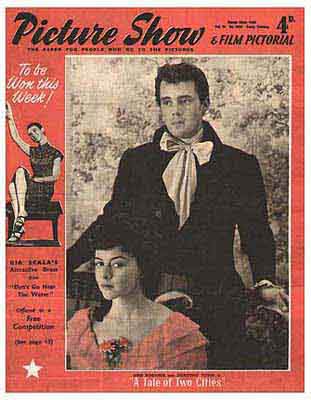
The jouissance of being-in-love, as we all know, is to do with becoming an automaton, you find yourself unable to resist re-citing all those corny lines - many of which are not not statements of feelings per se, but reflexive statements about what you are feeling i.e. ‘I’ve never felt like this before…’ - but REALLY meaning them THIS time, no, really, heh heh. To be in love is to be a cheap actor in the oldest of films. (As Ferry will sing much later, ‘I can’t believe/ it’s the same old movie/ that’s haunting me…’ )
But even angels there/ make the same mistakes
In love, in love
We have to be careful here, though. Think that much of the antipathy to CR is aroused by mistakenly equating it with detached cynicism. There is a detachment, but it is not total, and it is not cynical. The Lacanian gaze is Cold but not objective-positivistic. Lacan couldn’t be further from someone like A. J. Ayer, scornfully dismissing all statements about ethics and religion as meaningless babble. And for Spinoza, remember, ethics and religion come first. The aim is attunement of emotions to reason. It is only those who never destroy themselves too much who can retain a hostility to this aspect of Spinozism. Only those who have not had their reason totally disabled by their emotions can think that there is anything glamorous about the so-called irrational.
Thought trains set in motion/ Wheels in and around/ Express our ee-mo-tions….
The demi-automatism of being-in-love is not about being transported into mindless ecstasy but a reflexive permutating of a series - well, ultimately, two --- propositions: 'She loves me....' 'She loves me not...' That is why Masoch is the Truth of the amorous impulse --- the open secret of amour is that it is hostile to and disappointed by any supposed point of satisfaction or resolution. The function of the contract in Masoch is not to regulate the behaviour of the partners but to introduce the Undecidable. Is she merely acting out her role of ice queen or is that what she 'really' feels? Was her dropping of the masks still a part of the charade - or not?
What people hunger for, what they nostalgically crave, is exactly this state where their relationship with the other was still in-tension, not resolved, not Certain. Which reinforces what we already know: the greatest erotic-ethical problem we face is to maintain affection and enigma when the uncanniness of the period of courting puppetry is over, when the in-lovers become lovers and later partners, shared investors in a homely all too heimlich domestic scene in which they are forever condemned to be persons, the worst role of all...
It is CR's detachment - from reason-melting sentimental goo as much as from hot passions - that allows us to develop compassion, above all for ourselves. Sad passions are hard taskmasters.
* Ferry quickly migrated from made-up Glam queen to the 'classic' Cassablanca image ('I feel much more comfortable dressed like this'). But his noir persona was already replicant.
‘Today, even the mass media is aware of the extent to which our perception of reality, including the reality of our innermost self-experience, depends upon symbolic fictions, Suffice it to quote from a recent issue of Time magazine: “Stories are precious, indispensable. Everyone must have his history, her narrative. You do not know who you are until you possess the imaginative version of yourself. You almost do not exist without it.” Classical noirs remain within these confines: they abound with cases of amnesia in which the hero does not know who he is or what he did during the blackout. Yet amnesia is here a deficiency measured by the standard of integration into the field of intersubjectivity, of symbolic community: a successful recollection means that, by organizing his life-experience into a consistent narrative, the hero exorcizes the dark demons of the past. But in the universe of the Blade Runner or Angel Heart, recollection designates something incomparably more radical: the total loss of the hero’s symbolic identity. He is forced to assume that he is not what he thought himself to be, but somebody-something else.’ (Zizek, 'Tarrying with the Negative')

What you hear on Ferry’s songs up until at least ‘Mother of Pearl’ is Ferry exploring the Human Condition, as painted by Magritte, half-inside, half-Outside it (which is exactly what the condition is). (I suppose the Barthes of A Lover’s Discourse is someone with whom Ferry has an obvious affinity). A Cold procedure. And as Simon himself has said, Ferry’s voice at this stage is so cold it’s positively reptilian. Later, he will warm up, become enframed, believe in the role... and then, my God, before long... it's Otis...

** Easy to forget that Coward's Classic Anglo-persona, too, was simulated. He was declasse, son of a piano tuner, someone who fitted in nowhere, and not only because of his sexuality. (Fitting that Morrissey should have used a sample from one of Coward's flicks about working class life between the wars ['This Happy Breed' I think] at the beginning of 'The Queen is Dead'.) The story that most sums this up is the one about a young Coward having an affair with a boy toff. He wasn't actually excluded... just forced to live in servants' quarters on the edge of the grounds.
6. Been listening to Chic a great deal recently (btw does anyone out there own the albums? Can't get em for love nor money), so, when in the non-franchise Local record Shop, I eagerly snap up the Jan 04 Postpunk issue of Mojo , which also features a Chic story.

Can’t hear the precision-tooled discipline of their sumptuously minimal anorgasmic plateaus as Dionysiac-irrational either. Rodgers comments: 'I saw Roxy Music. Wow! Did THAT change my life.'
NEXT ISH: end of the year round up
COMING UP: Becoming-Lenin, Joy Division and amphetomodernism, Why Jung was not a Psychoanalyst
December 22, 2004
OBJEctively a misfit and aberration
Extract from my reference from Hull University, circa 1990.
Makes me sound kinda cool, but employable... hardly....
(Still, Kafka was good at his job by all accounts....)
December 21, 2004
NIETZSCHE ON THE WRONG SIDE OF KAPITALISM

Tim Wrong Side of Capitalism takes and brilliantly runs with some of my problems with Friedrich.
December 20, 2004
TOO MANY POETS, TOO FEW NURSES

The father's law: 'don't touch your mother.'
The mother's law: 'don't play in the tombs.'
Land, 'No Future'
Matricide too is necessary.
Killing the Father might not be as easy as it looks, if only because the Father is the always-already dead god, zombie despot-deity who acquires power only on the presupposition of his own absence. Freud's analysis of this process in 'Moses and Monotheism' remains exemplary, and Lacan only draws the consequence of it in his 'The Death of God'. The absent God of Jewish Monotheism is nothing other than the guilt that the apes of the primal horde feel for killing the Father-Master, he who has the sovereign right to total enjoyment.

Coiled plexes of phantasm: is the Primal Horde of jealous Beta-Male monkeys itself only a phantasm, the back-projected ur-narrative cooked up to retrospectively make sense of the miraculated appearance ('it comes like lightning') of the big Other? Or does the fantasy of the violent parricide of Master Monkey Pere Jouissance belong to these primate slave moralists, these fuming resentful manimals, hot with angry blood? Or, was there no fantasy at all, in other words: did it 'really' happen?
A conundrum as old as psychoanalysis. (Psychoanalysis is that conundrum.) Did it happen or did you remember it happening only because you wanted it to happen?
The death of God gets rerun so many times in the postmodern Gothic: Marlow-Willard coming to terminate Kurtz, Roy Batty at the apex of the High Castle crushing Tyrell's eyes
(so THAT'S Anti-Oedipus!)

Or so we are led to believe. In fact, the violent destruction of the Father is Oedipalism itself, obviously. If you are not to repeat Oedipus (reversed-Kronos - the son who kills and consumes his father), you must do as St Paul recommends and 'kill death'. Kill death, don't do the work of death for it by taking the place of the dead father.
Because the Father, remember, is nothing other than the traces left after his own dismemberment; the voices in your head, the revulsions and disgusts garrisoned in your body (What exactly is it that makes you recoil in horror? [Theweleit].) The mortification of your body without organs. Nietzsche says that it us who have killed God (even though we aren't aware of it); but really it would be better to say that God's death is something done to us. Or: in order to become speaking animals we must be the mortified children of a dead God.
So now that Daddy's dead, are we free to return to the mother, return to what seems to precede death, to the maternal body that was our 'first home and dwelling place' (Freud)?
No, because the Father's No only ever pretended to be a moral Law, when really it was a Transcendental code line. 'Do not touch your mother' really meant 'You cannot return to the maternal body.' The Father was only ever the caretaker, because, as every One has always known, this is the most impossible of impossible journeys and that, dream of it as you might, you could never return to that place where you, in any case, never were - and this voiding of identity, this suspension of separation in the amnion is precisely its appeal. But the way is barred, absolutely (with flaming swords, so we are told in Genesis).
Not that this prevents any amount of blood being spilled in the grotesque attempt to recover that dwelling place (and also: to deny that this is what you want). Motherlands are at least as dangerous as Fatherlands.
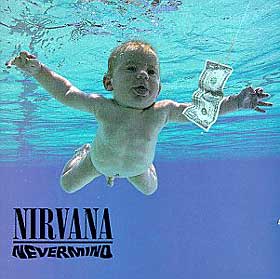
What Oedipus wants, really, is neither sex nor the death of his father. The Oedipus complex is only the fantasmatic dramaturgy that plays out the drive for (re)Unification at the level of simpersonality. Laius is what His Majesty the Ego must imagine blocks his way back to the Garden of Delights (G.O.D.) the entrance to which seems to be the maternal body.
Kurt Cobain wasn't the first nor will he be the last male who blows his brains out to go in utero. Denial of self, erasure of identity, auto-annihilation: think of all the male violence/ malevolence that arises from the sick lethewards lure of this bucolic Imaginary. He wants to be what God says he is: One.

'When Dostoyevsky's Kirilov commits suicide, it's to prove that his will is stonger than God's. By proving thus that the human I possesses supreme power, he believes that he is emancipating man by putting him in the place of God. ('If I kill myself I become God' - 'God is a neccessity and therefore He must exist.')
Something entirely different is at stake in [Maria] Tsvetaieva's suicide: not to be that is, in the final instance, to be God, to dissolve being itself, to free it of the Word, of God, of self. 'I don't want to die. I want not to be.' That is what she says in her notes.
In an analogous situation a man can imagine an all-powerful though always insignificant mother, to 'legitimize' himself, to make himself known, to lean on her and be guided by her through the social labyrinth, though not without his own running ironic commentary. Mery-Laurent for Mallarme, Madame Strauss for 'little Marcel', Miss Weaver for Joyce, the series of fiancees taken and rejected by Kafka. .... For a woman, as soon as the father's not calling the dance and language is being torn apart by rhythm, no mother can serve as an axis for the sacred or the farce. The girl tries herself: the result is so-called female homosexuality, identification with men, or a tight reign on the least pre-Oedipal pleasure. And if no paternal 'legitimation' comes along to dam up the inexhaustible non-symbolized impulse, she collapses into psychosis or suicide.'
- Kristeva, 'About Chinese Women'
(btw: given all that was said above, isn't it clear now why Kristeva's investment in the pre-Oedipal is the most Oedipal of errors? Because Oedipus is nothing other than the fantasy that there is a 'pre-Oedipal'. And because, as Kristeva herself recognizes, 'The symbolic order - the order of verbal communication, the primal order of descent - is a temporal order.' And what is the 'pre-' if not a temporal designation?)
In any case, what 'artistic' men, those who quite literally turn self-destruction into an art form, can always have relied upon is the Mother figure who protects and nurtures them. The assumption being that self-destruction (and self-destruction is fascism on the micro-scale, just as fascism is self-destruction on a macro-scale) is justifiable because something else More Important than joys and sadnesses is at stake.
There is no more dangerous assumption than this. The 'aestheticization of politics' (Benjamin) or the erasure of politics by aesthetics ('so what if he is fascist, at least he wrote good poems') are the twin engines of the Fascist Art Machine, which, alongside its allies in the RCC and the Family, has done more to legitimate suffering and abuse than anything else on the planet.
The alternative is a construction, in no sense a recovery, of the body without organs, which in any case you have never lacked ('any way, you already have one'). It is about discovering-constructing your true Gnostic Self, which has nothing to do with the fake familial personality Alien Parasite Entity that confuses itself with you (and convinces you that its usurpation is nothing of the sort). The BwO, by contrast, is radically orphaned, it has 'no pappamummy' (Artaud), it is wherever you are not.
Practically, this requires, then, not more Mothers, - Mother love is biofascism (my child/ren uber alles) - still less male Mothers, but an impersonal Affectionate Collectivity. Nurses are more impersonal than swooning poets, oblivated drug-users or cosmos-communers. Only agape can dissolve persons, families and nations.
December 17, 2004
Heh heh
All that and none of the proto-Mills and Boon passional Evil mind virus that is Wuthering Heights. Bargain!
(I dread to think what would have been in the men's top 10... Clancy... Star Wars the novelization.... Tolkien... Chris Ryan... )
December 16, 2004
UNPLUG YOURSELF
1. 'There are no people. Nothing at all like that.
The human phenomenon is but the sum of densely coiled layers of illusion, each of which winds itself upon the supreme insanity that there are persons of any kind, when all there can be is mindless mirrors laughing and screaming as they parade about in an endless dream.
But when I asked the lunatic what it was that saw itself within these mirrors as they marched endlessly in stale time and space, he only rocked and screamed...'
- Thomas Ligotti, 'I Have a Special Plan for this World'
2. ‘A person is someone who believes that she authors her own life through her own choices. That is not the way most humans have ever lived. Nor is it how many of those with the best lives have seen themselves. Did the protagonists in the Odyssey or the Bhagavad-Gita think of themselves as persons? Did the characters in The Canterbury Tales? Are we to believe that bushido warriors in Edo Japan, princes and minstrels in medieval Europe, Renaissance courtesans and Mongol nomads were lacking because their lives failed to square with a modern ideal of personal autonomy?
Being a person is not the essence of humanity, only – as the word’s history suggests – one of its masks. Persons are only humans who have donned the mask that has been handed down in Europe over the past few generations, and taken it for their face.’
- John Gray, Straw Dogs: Thoughts on Humans and Other Animals, 58-59
3. ‘… ‘If anyone comes to me who does not hate his father and mother, his wife and his children, his brothers and sisters – yes, even his own life – he cannot be my disciple’ (14:26)? Here, of course, we are not dealing with a simple brutal hatred demanded by a cruel and jealous God: family relations stand here metaphorically for the entire socio-symbolic network, for any particular ethnic ‘substance’ that determines our place in the global Order of Things. The ‘hatred’ enjoined by Christ is not, therefore, a kind of pseudo-dialectical opposite to love, but a direct expression of what Paul, in Corinthians I 13, describes as agape, the key intermediary term between faith and hope: it is love itself that enjoins us to ‘unplug’ from the organic community into which we were born – or, as Paul puts it, for a Christian, there are neither men nor women, neither Jews nor Greeks…’ - Zizek, The Fragile Absolute – or why is the Christian Legacy Worth Fighting For, 120-121
ANTI-LAIUS
 |  |
Seriously, though, isn’t the otherwise inexplicable and beyond-hypocritical paean to Blunkett today in the Daily Mail – a paper which has relentlessly hounded him every day for the past three weeks – proof of everything I was saying about the politics of natality?
While Dacre’s evil cronies still – rightly - maintain that Blunkett’s grossly unethical exploitation of his own office for his own ends was ultimately unacceptable, they nevertheless offer a magnanimous-in-victory ‘generous tribute’ to him today, the mangled corpse of his career still clamped between their bloodied fangs. Why?
Well, there is a kind of swaggering public school Nietzscheanism in play here. The Mail/Male’s ‘gentlemanly’ generosity in victory is the final humiliation for Blunkett, a conspicuously flouted sign of their uber-dominance. We are so powerful, we have no need for resentment, no need for crowing.
But their claim that ‘deep down Blunkett is a good man’ is based on two, related, affinities. Firstly, there is the obvious congruence between Blunkett’s harder-than-hard, Righter-than-Right, I’ll show the bourgeoisie that I can be every bit as iditotically authoritarian as they want me to be – in fact, I’ll be more rabid than their worst dreams! – with their own Suburban Supremacist Brit Fascist agenda.
Secondly, there is a sinister convergence of homosocial patriarchal-phallic fellow feeling. ‘He loved too much’, they croon. And what is the nature of this ‘love’? Isn’t it like the ‘love’ pathetically expressed by those other outraged patriarchs, Fathers 4 so-called Justice – men whose narcissistic obsession with their own ‘rights’ and ‘feelings’ as patriarchs means that they are indifferent if not outright hostile to any real, that is to say, social sense of justice. This ‘love’ is patriarchy in person, an appropriative, possessive love, the only love proper to fathers.
Cue outraged howls on the blogosphere and on the troll-stalked desolation of Dissensus.
‘I know someone who’s a father and he’s nice…’ ‘I’m a father, I’m nice….’ ‘You must be maternally deprived to have a problem with the family, we all KNOW that families are lovely and not at all a neuroticizing structure dedicated to the reproduction of Kapital (via the reproduction of its worker-consumer-slaves).’
As usual, however, such objections miss the psycho/ schizoanalytic point, which, as ever, is strictly formalist.
There are no biological fathers.
The Father function is semiotic through and through.
True enough, semen emitted by male-coded organisms fertilizes eggs.
But this is in no sense a relation between persons (which in any case do not exist, except as semiotic functions).
Lacan’s point about patriarchy is actually stunningly literal. What is to be a father? Well, it is to be able to give a child your surname (Sir name). Not that the name belongs to you. You are only its bearer, nothing more than the agent for the transmission of the patronym.
Like Jack Torrance in The Shining, you have always been the caretaker. The lieu-tenant, he who stands in …
But for what?
When Jack starts to wonder about who is running the Overlook, (‘I’m a man likes to know who’s buying his drinks’), he is met by polite demurral (Ulman, Lloyd, Grady, these men, these Hotel Representatives , are after all unfailingly polite, such nice men, aren’t they?) ‘That’s not something that should concern you, Mr Torrance. At least not at this point.’
And Jack turns away because he doesn’t want to see behind the False Faces, doesn’t want to see the Faceless, Nameless Horror that gives him a face and gives him a name.
The Management is the big Other, the symbolic structure itself, undead void, always-already dead God, semiotic vampirism without a subject. The Overlook, or patriarchal transcendence, does not exist until you instantiate – take care of – it. Like Sutter Cane’s Old Ones, it feeds on your belief, or rather your duplicity.
He dupes us.
I dupe us.
We’re dupes us.
You sure you want the Management’s approval?
You sure to want to party with them in the Overlook?
From Abraham to Jahweh, the price of admission is always child sacrifice.
(Mr Grady tells Jack in on uncertain terms what his responsibilities are. Mr Grady says that the Management has grave doubts about Jack’s suitability for the position. Perhaps he isn’t the right kind of man. Mr Grady – Jack: ‘didn’t you chop up your family into little pieces?’ – knows exactly what must be done. Jack must correct Danny.)
The sacrifice always involves mortification, not the actual death of the organs, but the death of the body without organs. Symbolic death is both a necessary and sufficient condition for the reproduction of the Law of the Father. Imprisonment within the face, acquisition of replicant fake memory (‘so THAT’S who I am’, Mummy-daddy-me, Wendy-Jack-Danny).
That is why Jahweh spares Isaac. Organic death would mean the curtailing of the undead circuit. Who would there be to pass on the symbolic order if Isaac-Oedipus were no longer capable of reproducing (it)?
So, induction into the symbolic order – ‘you’re MY child now’ – is a death sentence, as signaled by the Lacanian pun – the Father’s Nom/ Non (name/ no).
Mortification must always be presented as munificience; look, I have spared you = I have given you life (when I could have killed you). Now, mortify yourself, be the dead agent through which my always-already dead voice speaks.
Daddy has no doubts about the right thing to do. He must correct us, and he has to keep ‘outside parties’ from interfering with what he has to do. It’s his responsibility, and Mummy and Kid have absolutely no conception of what that involves. Other people, responsible men who know the meaning of duty, have told him what needs to be done. He has to protect us, even if that involves beating our brains out.... Even if that involves....
Well, where exactly would you stop, Jack? There is no limit to a father's love for his child....
Danny: 'You wouldn't ever hurt us would you Daddy?'
Jack: 'I love you more than anything in the world....'
(If only it wasn't for her).
‘Destroyed by his love for a woman.’ (The Sun, today)
= Destroyed by a woman
= Destroyed by woman.
There can never be too few Fathers. A few more male-born carers wouldn’t go amiss though.

Goya, Kronos devouring one of his children
'Kronos, the most honest of fathers...' (Deleuze-Guatari, Kafka:Towards a Minor Literature)
December 15, 2004
Cold rationalism beyond the pleasure principle
'From the very beginning, when life takes us under its strict discipline, a resistance stirs within us against the restlessness and monotony of the laws of thought and against the demands of reality-testing. Reason becomes the enemy which witholds from us so many possibilities of pleasure. We discover how much pleasure it gives us to withdraw from it temporarily at least, and to surrender to the allurement of nonsense... More serious hostility to "reason and Science, the highest strength possessed by man", [Goethe] awaits its opportunity;... it is faithful to the assertions of occultism so long as these alleged facts can be taken as breaches of laws and rules; it lulls criticism to sleep, falsifies perceptions and enforces confirmations and agreements which cannot be justified.'
Freud, 'Dreams and Occultism' (1933)
December 14, 2004
Dionysus and the crucified: oblivion, eros and agape
There are a number of other reasons I find what Simon is saying deeply problematic.
One goes back to his typology of drugs in Energy Flash. In a moment of neologisticonceptual genius, Simon divides the drugs that have driven the rave engine into two groups: utopiates, which deliver users into an egoless bliss, or obliviates, which snuff out consciousness altogether.
Simon has long drawn upon Nietzsche’s distinction between the Appolinian and the Dionysian. Apollo, god of measure and moderation; Dionysus, demi-animal demon of excess and ecstasy. Now, this clearly is not intended to map onto the distinction between utopiates and obliviates, because both of these offer different varieties of Dionysian intoxication. (In other words, Simon’s hardcore continuum is an intensive scale with total ‘utopiation’ and one end and total oblivion [presumably death] at the other. By contrast, the Appolinian in pop is represented by Kraftwerk and one of their principal influences, The Beach Boys).
It’s worth remembering, by the way, that, contrary to popular misapprehension, the Nietzsche of The Birth of Tragedy is not of the party of Dionysus. Rather, what Nietzsche celebrates is the tension between Apollo and Dionysus; it is this tension that Socrates allegedly terminates by instituting ‘Western’ philosophy.
At the end of his life, Nietzsche, his mind going into final meltdown, began to sign himself ‘Dionysus or the Crucified’. The crucified is what the third term that breaks into Nietzsche’s pagan dyad. (And the image of ‘God on the cross’ is something that haunts and agitates Nietzsche. It’s an image of a humiliated god that would have appalled every religious believer prior to Christianity’s reversal of all values, Nietzsche claims, aghast, fascinated. It’s also an image, as Ginzburg pointed out last week, that haunted Bataille.)
As John Gray points out in Straw Dogs, Nietzsche was a thinker who was unable to leave Christianity behind. Unlike Schopenhauer, who renounced the world (and with it will and representation), Nietzsche retained faith with the Christian injunction to be positive, relentlessly positive, about this wonderful Garden of Delights into which we are so casually thrown. Erroneously calling Christianity ‘Platonism for the people’ (when, as Ray points out, non-Gnostic Christianity is actually ‘Aristotleanism for the people’), Nietzsche set about the reversal of Plato. Now, being imprisoned in the Cave-Matrix-Simulation of fleshly carnality is good (or at least, there is no point saying it is not good, because it is all there is); there is no ultimate truth, and even if there were, it is a random act of evaluation that prefers reality to appearance.
And so Nietzsche builds the commonplaces from which postmodernism, or the cultural logic of late capitalism, will be assembled. It no longer matters that the Cave-Matrix-Simulation gives us a partial picture of reality. Partiality is all there is. Perspectivism is the basic condition of all life. Plato’s yearning for a pure, abstract knowledge untainted by carnalist localism is a sad and oppressive pipe dream. Yes, C-M-S is illusory and delusory, and yes we know that, but we must continue to live in it. More than that, we must celebrate it!
A crucial scene for Nietzsche the Neuromantic.
Gibson’s Neuromancer. Neuromancer, the anthropomorphic AI, traps Case in a wrap round simulation constructed from his own memories. He is with his former lover Linda Lee, who in meatworld is dead. The great postmodern temptation – do you identify with the techno-externalised products of your own mind (even while recognizing that your ‘own’ ‘mind’ is a techo-externalised projection of/ from the interior walls of Cave-Matrix-Simulation)? Vertigo, Solaris, Sphere.
What would Nietzsche’s advice to Case have been? Why, he would advise exactly as Neuromancer does. Stay inside C-M-S, enjoy it. It will be as if real, and that’s all you can expect.
So why does Nietzsche sign himself the Crucified at the end, then?
Is his invocation of the crucified some sickbed confession, a last-moment-of-lucidity succumbing to the oppressive forces that he had fought all his life but which in the end were too strong for him? Is the Crucified nothing but the Anti-Antichrist?
I prefer to read it as a failed breakout than as an incipient breakdown.
What Nietzsche lacked of course was Anti-Oedipalism. His vehement loathing of Christianity betrayed precisely the resentment that he identified as the defining psychological feature of his object of hatred. His disavowed love of Christianity (or the love of Christianity that he demonstrated through his disavowal of it) was manifested not only in his translation of its ethical injunctions into (this) worldly terms (no longer love God, but love life, no longer worship the Creator, but worship creativity) but also in his inversion of its values (no longer compassion, softness and love but harshness, hardness, hatred….)
Anything so long as you are excited.
And – ask Marilyn Manson – attacking Christianity is very exciting. No question about it.
What is left out of Nietzsche’s picture is the strength and power of Christian agape. There seems to be no good translation of agape. ‘Love’ or ‘charity’ are words so overcoded, so hackneyed, so encrusted with hippy yucky muck and Methodist jumble sale piety as to be near unrecoverable. But what is crucial in Saint Paul’s account of Agape is its clear differentiation from Eros. Agape is disinterested, a kind of calm, impassive affection offered, without fear or favour, to all. Eros is passionately self-involved, a narcissism made for two in which your love for the other depends upon their feeling for you. A hideously beguiling machine for mutual torture. ‘I will let you hurt me/ because I know it hurts you,’ as Howard Devoto, one of the most cold-eyed observers of this monstrous machine observed. ‘You want to hurt and crave again….’
Nietzsche excoriates Paul, as he excoriates philosophers such as Spinoza, Kant, and the stoics, for preaching indifference. Indifference is impossible, Nietzsche proclaims, all blood draining away from his head to feed the engorged theoretical phallus of his excitation. Paul is a life-denier, a life-hater, because he denies perspectivity, the basic condition of all life!
We must credit Alain Badiou with rescuing St Paul from his reputation as the architect of corrupt, politically compromised, misognynistic Catholicism. Astonishingly, on Badiou’s reading, Paul appears as a figure whose theology is only a hair’s breadth away from that of the Gnostics. (By the way, if you suspect that Badiou’s Paul is some kind of hyperfictional postmodern construct, read the books attributed to Paul in the New Testament. They really are every bit as radical as Badiou and Zizek say they are, yet another proof that the strata reterritorialize on the most deterritorialized elements.) Jahweh and the worldly are to be rejected in favour of the single ethical injunction to love others and to love God as you love yourself.
To return then to Simon’s typology. What is missing from Simon’s drug typology – which I, as a ‘proletarian puritan’ (Infinite Thought), prefer to read as a typology of affects (‘what you can do with drugs, you can do by other means’ – Burroughs) – is precisely the non-Dionysian, anti-Nietzschean, affect: agape. Yes, ecstasy is famously a luvved up drug, but – I’ve never taken it, someone will have to tell me – isn’t its high a kind of oceanic flowing postitivity? In other words, such love is still within the province of Eros, whereas, much like Spinoza’s third kind of knowledge, agape is intellectual love.
And if my number of posts on sonic culture has declined, this certainly does not reflect any lessening of the importance of sonix in my life. On the contrary, I always know that I am recovering from being sick when sound starts to affect me. It’s the only drug I have ever needed, very precise, very reliable. But its effect on me is precisely not Dionysian intoxication. At its best, it can make me more receptive to, more capable of expressing, agape.
Agape is a sober affect, whereas everything Nietzsche tries to force upon us is an intoxicant. Agape precisely entails a harshness more demanding than anything Nietzsche’s onansitic fantasies about warrior men ever come close to. The Crucified must mortify themselves in order to kill the death of carnality, the organic intensive death that your members feed upon and crave.
It is a love that entails not the dissolution of the self that Romantics everywhere, from Nietzsche himself to Theweleit’s Freikorps soldiers, have destroyed others and themselves in pursuit of, but the patient dismantling of the self. This is very far from being an academic project for me. At work, I am confronted with students engaged in every form of self-destruction, from frittering away their time on footling hedonism, to literal self-laceration and suicide attempts. The task of finding a way of interrupting the circuit of aubse begetting abuse, of destruction begetting self-destruction couldn’t be more urgent. Cold Rationalism is that circuit breaker, the escape route from the dreary prisonhouse of the human.
December 13, 2004
An Excarnate thought for the day from St Paul
For to be carnally minded is death; but to be spiritually minded is life and peace. (Romans 8:6)
Blissblog and cold rationalism: the discussion continues
Simon responds to my hyperstition posts:
I suppose ultimately I don’t really get what he’s talking about when he uses the word “rationality”, now that’s supposed to include emotion and the body?
It doesn't include them: but the point is to subordinate passive (i.e. self-destructive) emotions to reason (= identification of the causes of actions) in order to increase the capacity to act.
The body that is involved is obv not the organism.
But of course you aren't going to see what CR means if you insist on imposing the very Romantic dichotomies it is designed to crash. :-)
But judging by the general tenor of his arguments--anti-mammalian, squeamish about emotion--the key word, the one he's got most invested in, is “cold”.
I'm not squeamish about emotion. I'm just committed to extirpating self-destructive and destructive passions (in myself first of all obv). The CR programme is also an erotics of affect - it is about emotional engineering, not about the removal of all affect.
Isn’t thought, however abstractified and supersublimated, always an emotion, though?
In what sense? Certainly the other way round is true: emotions are always thoughts (that's psychoanalysis)
That’s why the notion of artificial intelligence is a non-starter; what could motivate such an intelligence to be bothered with thinking? Thought without emotion is a sail without wind. You have to have a body, monkeymatic flaws and all, to have the energy and will to think.
Why wouldn't AI have a body? Why would drives (what Spinoza calls conatus) be limited to biotic organisms?
Even the impulse to achieve a cold precision of thought is itself an emotional impulse, somatically rooted.
There's two ways you can take this; one goes back into Nietzschean perspectivism (i.e. the arguments he makes against Spinoza, Kant and the stoics - i.e. all the indifferentists - in the first section of Beyond Good and Evil); the other is into a kind of Spinozist neurophilosophy in which you say, yes, the impulse to achieve precision of thought is emotion, but an active emotion, not a passive one....
Equivocations? The basic idea is pretty clear, I think.
Sorry, yes, I meant equivocation in the rhetorical sense, i.e. things that are different being treated as if they are the same thing.
Music, as far as I can tell, belongs to a whole category one could designate with words like “non-sense” and “un-sane”.
Of course music is pyschotic. But then so are all Cold Rationalists.
There’s no point to it, and that’s, sort of, the point of it. Lots of good things in (my) life actually fit those categories, and my response is to affirm that glorious non-utility (I suppose that's the dreaded “vitalism” and Romanticism one hears about? I think these must be the bits in D&G I really like!)
But here again we're back to equating rationalism with utilitarian instrumentalism. It's perfectly Cold Rationalist to do anything to increase your affects. It's not as if people just put on music for no reason; they don't just get up and put on any record in an aleatory way regardless of the effect it has them. That would be 'irrational'. They presumably put on records because they have anticipate particular types of stim. Where Simon and I differ is in the idea that there is some ineffable Factor X involved in this process. I think that, in principle at least, the effect a particular sound sequence has on a body could be described neurologically and musicologically. The fact that such description might not arrive is a sign of human abjection, not that there's something mysterious involved.
Why the investment in mystery? It's religion in the worst sense: authoritarian mystagoguery. By contrast, cyberpunk has always been compatible with Spinozist religion because both insist that stim can be precisely quantified, analysed and replicated. Even - espcially - God is subject to rational analysis.
It also strikes me as perhaps not entirely unconnected that since Mark’s been on this cold rationalist tip, he’s barely written anything on music. Perhaps music in its essence is too much an incitement of stuff that’s not in the CR programme.
If this has happened, it's more a question of widening than narrowing though isn't it? Besides, the Mark Stewart piece and the Glamasochism piece spring immediately to mind as two big predominantly music-based posts. (btw, stand by for big Joy Division punk modernism to postmodernism post....)
In any case, I utterly reject the idea that there's any inherent connection between music and stuff that's not in the CR programme. Yes, most music, like most human activity, is abject, dedicated to the (re)production of sad passions. But, as Leibniz said, music is just organized counting, not some encounter with the inexplicable. And sonic culture, as we all know and celebrate, has been involved in the deprogramming of pacified human bodies, a process that is increasingly connected up with the demystification and demusicalization of sound production.
Far from CR being inimical to music, the cruel might say it is a philosophical vindication for justifying what I was listening to at the age of 14.... :-)
December 10, 2004
December 09, 2004
HOW TO KEEP OEDIPUS ALIVE IN CYBERSPACE
1. Contaminate k-space with the monkey supersition that there are such things as 'persons'.
2. Reject rationality and promote the propagation of opinionist virus (= Nietzschean perspectivism = embodied/embedded subjectivism = Kapitalist ideology).
3. Ensure the continued disengagement of reason by personalising all discourse.
'You're only saying that because you are....[insert sex/ ethnic/ sexuality/ abuse/ marital status here as applicable].'
4. Promote the use of certain common fallacies of reasoning, in particular:
Irrelevant appeal to tradition/ authority - 'We've always done that here...' - or to popularity - 'Some people might like it...'
The Ad hominem fallacy - attacking the arguer instead of the argument (this especially popular amongst lawyer-politicians and their defenders).
The straw man fallacy - invent a deliberately weakened version of your opponent's position, demolish it, then claim to have refuted their argument.
The Spinoza Agents (the Cold Rationalist equivalent of Gibson's Turing Cops, who, unlike the Turing Police, are dedicated not to the curbing of AI but to its acceleration) report that a new and dangerously virulent form of artificial stupidity is spreading unchecked throughout k-space. This is a nasty combination of the ad hominem and straw man irrationalist mind viruses, provisionally codenamed 'straw ad hominem'. This oedipalizing idiocy proceeds thus: given that this argument challenges commonsense and what is consensually accepted, the person who presented it must be [insert allegedly derogatory remark about mental health/ marital status/ upbringing here], therefore anything they say is to be dismissed. No need to refute their arguments substantively, natch.
The SA's warn: 'this is unusually moronic even given the low standards we expect of you jumped-up monkeys. Watch it.'
All I got for Christmas was some abuse virus
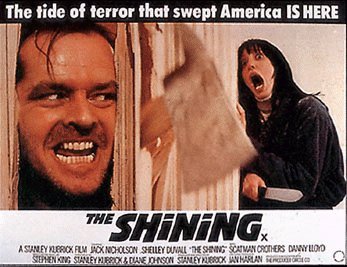
Happy Families
LOL.
But I must point out that, as ever, my argument against reproduction is structural, not personal.
Infinite Thought rightly makes the distinction between misanthropy at a species level - which we share - and misanthropy at the level of individual people, which we don't.
As anyone who has seen me cooing over them will know, I like children. It seems to me, however, that all too often it is parents - grim faced, drained, irritable - who don't like their children. The message their joyless dutifulness sends to children couldn't be clearer: you are a burden, you are sucking the life out of me, but - 'in my heart' - I love you. And you must redeem me, make my life worthwhile (because I can't do it myself).
It's an old trick. Just ask Jahweh.
Obviously obviously obviously this is not all parents. But I've seen enough examples to know that such a syndrome is far from anomalous.
December 07, 2004
ANTI-NATAL
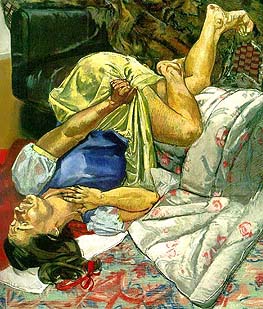
Schopenhauer: 'If the act of procreation were neither the outcome of a desire nor accompanied by feelings of pleasure, but a matter to be decided on the basis of purely rational considerations, is it likely that the human race would still exist? Would each of us not feel so much pity for the coming generation as to prefer to spare it the burden of existence, or at least not to take it upon himself to impose that burden upon it in cold blood?
For this world is Hell, and men are on the one hand the tormented souls and on the other the devils in it.'
The Specials: 'Ain't he cute? No he ain't/ just another burden on the welfare state/ ... haven't you heard of the starving millions/ haven't you heard of contraception?'
The prospect of yet more exploitative taxes to support reproducer indulgence means that a questioning of the bio-political privileging of natality is long overdue.
Reproduction in the west is a lifestyle choice. It is certainly does not put reproducers into a special category of the morally superior for whose 'sacrifices' the rest of us should be grateful.
On the contrary, in fact. Ethically speaking, reproducing is immoral and irresponsible. Looked at coldly and rationally - i.e. the only way to look at it - the human population is something that needs to be dramatically reduced.
'In 1600 the human population was about half a billion,' John Gray points out in Straw Dogs. 'In the 1990s it increased by the same amount. People who are now over forty have lived through a doubling of the world's population.' What Gray, following Lovelock, calls 'human plague' exerts pressure on the world's scarce natural resources, amping up tension and conflict.
It's only through the utterly discredited logic of modernization that increasing population at this rate makes sense. Modernization - whether in its State- socialist or Kapitalist mode - assumed that all human needs could be met by increasing productive capacity. But as Green theorists have established, this is based on a fallacy. The productive capacity of human beings depends upon natural resources, and these are finite. No matter what market demand there is for oil, it cannot be spirited out of nothing.
While it's true that the oil-fixated super-short termist stupidity of current Amerikkkan economic thinking is due to hit the buffers imminently so that a change in global energy consumption will have to occur, simply changing energy sources will only deflect the problem of overpopulation, not alleviate it. Human plague will have to be reduced - and the planet has its means (disease, eco-catastrophe) even if homo rapiens desperately scavenging for resources don't themselves substantially reduce their own numbers through warfare.
The economic argument for encouraging people to have children is that there is an ageing population. If we do not shift the balance, then the economy will collapse under the weight of demand from those who need support but are no longer economically productive. But the obvious solution to this is not more children (who, at best, will be economically productive after sixteen years) but increased immigration.
In Britain, it is well known that there is a skill shortage now. Encouraging workers from abroad with suitable skills to immigrate into the UK would thus have a double benefit. Not only would the problem of the ageing population be addressed, the UK would also increase revenue from taxation (since such workers, unlike children, would contribute to the public purse instead of being a drain upon it). Again and again, statistics bear out the obvious truth that immigrants work harder than indigenous populations.
Of course, there is no prospect of anything like this happening under the current soft fascist Blairite regime. It's no accident that the sentimental indulging of people's alleged 'right' to have children goes alongside a hostility towards immigration. As the propaganda of two of its most obvious exemplars eminently demonstrate, fascist institutions are always rabid in their obsession with increased birthrate. The RCC's hostility to birth control and obscene vitalist lust for more children (no matter how poor or miserable their lives will be) is well-known. Similarly, Mussolini's 'battle for natality' is typical of the modernizing fascist impulse.
'Mussolini believed that his Italy had a smaller population than it should have. How could it possibly be a power to reckon with, without a substantial population and a substantial army? Women were encouraged to have children and the more children brought better tax privileges – an idea Hitler was to build on. Large families got better tax benefits but bachelors were hit by high taxation.
Families were given a target of 5 children. Mothers who produced more were warmly received by the Fascist government. In 1933, Mussolini met 93 mothers at the Palazzo Venezia who had produced over 1300 children - an average of 13 each!'
Reactionary political programmes always insist on the value of life as such. But this sacralization of life of course goes alongside a degradation of people's actual conditions of life. Don't complain, be grateful that you're alive, sing in gratitude to the heavens for allowing you to come into this Garden of Delights.
Seemingly paradoxically, those political systems which actually want to improve conditions for people tend to underrate the value of the sheer fact of life. This is partly because having children is a more or less explicit ratification of the essential goodness of the world. But to change things - or to want to change things - entails recognizing that there is something deeply evil about the world and the worldly. That is why many of the Gnostics thought that copulation itself was evil, since it recapitulated the original act of the deranged drunken demiurge who deluded himself into believing that he had created the world. (Besides, those with children are especially prone to reactionary thinking and behaviour: 'I would, but I've got to think of the kids.' But as Richard Pryor asks in Schrader's Blue Collar, 'What makes your family more important than everyone else's family?')
Indulging your atavistic selfish gene impulse to replicate is neither rational nor moral. The ethical choice is to adopt or foster children. There are many abandoned children already in this world who need that care. Meanwhile, if others want to reproduce, that is their choice (just as smoking should be), but the State should not be in the business of encouraging it.
December 03, 2004
Chronic demotivation

A response to Infinite Thought's not-before-time not-before-time attack on stoners.
What is supposed to be good about dope? The problem with it is not just the resultant pyschosis but the ACTUAL STATE it puts people into in the first place - chronically demotitvated, lethargic, filled with the kind of idiot porcine self-satisfaction that is the dialectical obverse of feeling paranoid. 'Better to be Socrates dissatisfied than a pig satisfied....': not for stoners, whose only commitment is to the pleasure principle, to the shortest route to total relaxation. Thought, thought requires effort man, stop oppressing me, let me sit here and babble senselessly, coz that's creative, right, don't mess with my mojo, but buy me some munchies when you go to the shop, yeh?
What could be better proof of Lacan's claim that the nirvana principle - the drive towards the total extirpation of all tension - is not the death drive proper but merely the highest expression of the pleasure principle? Stoner stupefaction seeks only to remove tension, to become a zombified consumer, shambling to the fridge or the late-night garage to satisfy the constant craving of the insatiable Tungsten Carbide stomach of Kapital opened up in your organism by the dope.
The meat, and all it wants....
Thought, meanwhile, begins beyond the pleasure principle. As Houlbecq says in relation to Lovecraft, only those who are dissatisfied with life want to read and think. What from the perspective of those slaved to the pleasure principle is the introduction of a discordant and dysfunctional element ('hey, Infinite Thought, why you going to the library? Why don't you mong along here with us? Come and play with us, Nina, FOREVER....') is from the POV of anti-naturalist kommunist konstructivism the positive libidinal motor of an ever-complicating process of intelligence-production.
I know someone, probably Gleebot, will immediately leap on what I'm about to say and produce some counter-examples which will allegedly disprove it, but most stoners are males, aren't they? More than that, and here's why any empirical refutation won't wash, smoking makes you male. Self-satisfied, concerned only with yourself, unable to care about others even if you wanted to.
One of the many myths about stoners is that they are not aggressive. It's true that, in themselves, they don't FEEL agressive. Their blissed out idiot state of hyper-relaxed slackness precisely wipes away any feeling that would interrupt their communion with their own organism. But when this onanistic self-involvement is threatened, well, then we see how irascible, irritable and bad tempered stoners can be. Stoners demand the right to their own (passive) aggression, but detest any show of aggression from others, precisely because any antagonism - particularly political antagonism, my god antagonism and rationality, what could be more of a DOWNER? - disrupts their 'right' to take pleasure. Bad vibes, man.
I need hardly underline the point that young people voluntarily subordinating themselves to this pacification program is not exactly politically positive. It's not only because they all smoked it themselves when they lolled about on a full grant or because their kids are all smokers that the government is in favour of relaxing the legal penalties on the smoking of the supposedly harmless drug. It's because it is politically expedient. What could be better for the Komissars of Kapital than if half the population spends all their spare time (i.e. convalescence from reproduction of Kapital time) smoking dope and the other half spends it on SSRI anti-depressants?
Fukuyama's Brave New World inspired argument against SSRIs was that, in producing a feeling of wellbeing they remove the psychological motivation for action, for proving yourself. Though Fukuyama's argument is obviously advanced in the services of pro-Kapital enterprise, its logic can also be used by communists. You will not struggle against Kapital - you will not struggle against anything - if you are emolliated by narcotics.
Of course, the obvious counter-example that people will reach for is Rastas and dub. But the rasta relationship to dope was very different to that of most white workers toking on their time off, or students spending all day in what The Fall, gloriously, called 'a State-subsidized cannabis haze'. It was not only that the level of downpression to which the Rastas was much greater than the 'hard week' of the white worker, it was that their consumption of drugs was part of a disciplined religious and political ritual. Exactly the opposite, then, of those who turn to dope as a means of fugging out the world.
